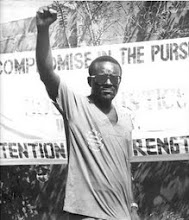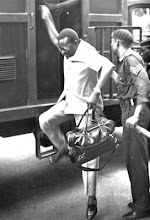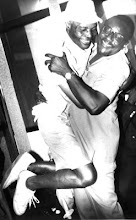 |
| Prof. Yemi Osinbajo at the Lecture |
The event is held yearly is to celebrate and promote the ideas, principles, courage, achievements and contributions of late lawyer and human rights activist, Chief Gani Fawehinmi, a Senior Advocate of Nigeria.
Two things made this event stand out. One of them was that an Integrity Award was conferred on late lawyer and human rights activist, Bamidele Aturu and the Vice-Presidential candidate of the All Progressives Congress, Professor Yemi Osinbajo, who is a Senior Advocate of Nigeria.
The other thing that made the event unique was that a book titled: Stand Up for What is Right, Even If You Are Standing Alone, which is a compendium of lectures delivered at the yearly event from 2005 to 2014, was unveiled and launched. The presentation was done by Femi Falana, a Senior Advocate of Nigeria.
This year’s lecture was captioned Ethnicity, Religion, Illiteracy: The Promises and Illusions of Democracy in the Struggle to Uplift the Nigerian masses from Impoverishment. Among those who spoke at the event were, Anthony Cardinal Olubunmi Okogie who was the Chairman of the event, Femi Falana, a scholar, Dr. Timilehin Zaid and the Chairman of the NBA, Ikeja Branch, Yinka Farounbi. Olubunmi Okogie:-
This former Catholic Archbishop of Lagos, said that the President Goodluck Jonathan-led Federal government was clueless just as he stated that the country needed an urgent rescue from what he described as “imminent brink of irredeemable destruction.”
Okogie said, “There is extra urgency to rescue Nigeria. This is the time when every right-thinking Nigerian must pray to hate the present situation strong enough so as to desire the fortitude to act right.
“This time does not allow for indifference. All must rise to save Nigeria from the brink of irredeemable destruction. This is the time we must play politics of the best, for the best position, in order to guarantee the best for our nation.
“Let only those with the fear of God and love of their neighbours rule Nigeria; only those who know what to do should sit at the helm of affairs. Enough of mediocrity, enough of failures, enough of nepotism, and enough of ethnicity.”
Okogie, who described Fawehinmi, as a courageous, principled, selfless and detribalised statesman, stated that the late activist was restless in his grave given the present state of the nation.
“It is said that Gani Fawehinmi died a sad man. For a man, who was fearless in speaking his mind without caring whose ox is gored. He was jailed many times and detained many more times for no personal crimes but for his struggle to ensure justice, fairness and good governance in the country, dying without seeing signs that the new dispensation he struggled for will be achieved, is a devastating blow. Now in his death, the knowledge that Nigeria had deteriorated so badly since his passing away must be giving Gani sleeplessness in his grave. We may think we know Gani; one thing we may never fully comprehend, is what motivated a Nigerian in the midst of the opportunities in our style of wealth without accountability, to still remain different, disciplined and selfless.
“Gani must be terribly worried about the general decay in our political and economic atmosphere which is riddled with lies, deception, incompetence, lawlessness and lack of vision.
“Gani would be saddened that in this age and time, that Nigeria is still playing politics of religion and tribe/ethnicity when the primary concern should be capability. Gain would have been grossly infuriated with the quality of leadership in Nigeria today and would have fought intensely for a change.”
Femi Falana:-
The human rights lawyer also paid a glowing tribute to Fawehinmi
“Since the Russian Revolutionary, George Plekhanov, wrote 117 years ago his famous essay entitled ‘The Role of the Individual in History,’ historians on the Left and Right have been debating what impact could an individual make in changing the course of history. Although Plekhanov strategically disagreed with other leaders of the Russian revolution, his younger comrade (and by the way, a lawyer too), Vladimir Lenin, acknowledged his “immense contributions” especially in providing theoretical insights. One of those contributions of Plekanov was theorising about the interplay of objective and subjective forces as exemplified in the essay we are referring to here.
“It is hardly imaginable for any theoretician to enter into the debate on the role of the individual in history in the Nigerian context today without examining the role of Gani Fawehinmi whose memory is richly honoured by the presentation of the book under review. Indeed, there is hardly a more fitting epitaph to Fawehinmi than the title of the book, STAND UP FOR WHAT IS RIGHT, EVEN IF YOU ARE STANDING ALONE. Every minute of the life and times of the man, described by Justice Kayode Esho in the book as “one of the greatest advocates that have worn the Silk,” was a teachable moment. In theory and practice, Fawehinmi taught us lessons about what difference a man make without prejudice to the defining role of organisation and other historical forces. As Professor Bolaji Akinyemi once put it another forum, it is said that a tree does not make a forest, but Gani’s tree actually strove assiduously to make a forest in the struggle for social justice and freedom.
“Like every human being, Gani, of course, had his faults, but you could never accuse him of not standing up for what he was convinced about; he was never lacking in the rare virtue of courage of conviction. He stood up for his conviction by tirelessly offering the public ideas to solve socio-economic and political problems. He not only spoke out loudly against injustice and unfreedom, he also acted in the courtrooms and on the streets. That is why the Ikeja NBA should be commended for keeping the memory of Fawehinmi alive with the bounteous harvest of ideas embodied in this book of great value. It is a great service to posterity.
“Fawehinmi devoted his life to the advancement of human progress; embodied in the well-edited book are ideas from divergent perspectives about what is to be done to advance human progress. The reader is therefore invited to partake freely in the big harvest of ideas on freedom, democracy, good governance, legal activism, fighting corruption, eradicating poverty, electoral integrity and a people-centred political economy. These themes and others efficiently explored in the book, of course, coincided with the themes of Fawehinmi’s perspicacious interventions in the public sphere.
“In fact, they defined Fawehinmi’s life historically. Between 2005 and 2014, the Ikeja NBA, the organisers of the Fawehinmiism Lecture Series, invited men and women imbued with some ideas in the respective themes to make presentations which are now complied into a book in an exemplary institution-building manner. It is salutary that those who institutionalised this remarkable Lecture Series were able to attract these great women and men of ideas to be part of this feast of the minds over the years.
“Furthermore, it is a tribute to the culture of documentation, which, as we all could remember, was one of those great Fawehinmi’s passions. Fawehinmi’s passion for ideas and documentation was such that it would be eternally regretted that he couldn’t publish his definitive memoirs before the callous illness took over his life. But his numerous polemical statements and insightful publications would remain veritable sources for synthetizing ideas for progress. Meanwhile, if you like to decode the philosophy of Fawehinmiism, the starting point may as well be reading STAND UP FOR WHAT IS RIGHT, EVEN IF YOU ARE STANDING ALONE. Indeed these words came directly from Fawehinmi himself. “
Timilehin Zaid:-
The scholar and Muslim Cleric, Dr Timilehin Zaid, stated that if people really kept to the tenets of the religion they professed there would be a change in the country.
“Though not many will agree with me if I say true religion has the solution to the myriad of problems facing Nigeria. By religion, I do not mean a particular faith tradition. I mean religion as it is and as it ought to be. I mean the universal value system common to all faith traditions. If we are truly religious, as we often pretend to be our actions would be guided by God-consciousness. We would know that the promises we make, the responsibilities we bear and our numerous undertakings all have a trans-human reference. Absolute justice is the soul of any true system of governance. All religions including African Traditional Religion social justice in its broadest sense which includes justice, fairness and righteousness.”
Yinka Farounbi:-
“Gani Fawehinmi lives permanently in the subconscious minds of the people. Apart from JesusChrist and Prophet Mohammed, only few other persons have their names constantly mentioned like Gani.”










